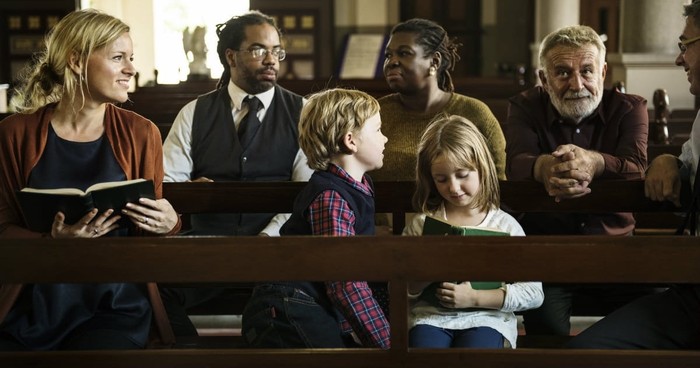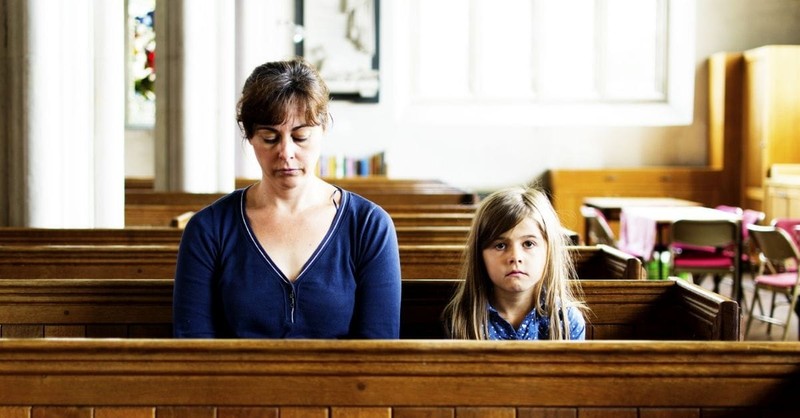
I parked my car in the church parking lot and silently gave myself a pep talk. You can do it. Smile, act normal, try to connect and make friends. Be friendly. I knew the drill of being on the other side- of welcoming the newcomer and making them feel connected, but I didn’t know how to be the newcomer. I grew up as a pastor’s kid, never having had to find a church or build a community as an outsider. I was a grad student in seminary when I had to figure it out for the first time.
I smiled at the greeters, took a bulletin, and slid into the back row hoping to blend in. I pretended to be busy reading the order of worship while my mind raced with conversations and scenarios to prepare myself for potential real ones. I ached for a church to call home, but would this be the one?
We received the final benediction, and even though everything in me wanted to run out and get away from the awkward conversations, I told myself to buck up and make an effort to connect during the after-service fellowship time. I did this week after week, and each effort made on both sides- the church’s and mine- created a tiny bond that over time became the foundation for the community I’d build there.
Deciding on a church community is hard when choices abound, but after the church is chosen, building community there may or may not develop smoothly or quickly. Churches are a gathering of imperfect people, so while some things are out of your control, here are 10 things you can do to build community where you’re at:

1. Commit to the long haul.
Every church has its pros and cons. Every church is broken because it’s filled with broken people who are in the process of being redeemed. So no matter where you go, the question is, will you commit and stay? Your commitment to the long haul will keep you grounded when circumstances aren’t ideal for you or when you feel drained from the effort you’ve been making. And staying for the long haul will be how you can experience the church fully through different seasons in your life and in the church. It takes time to build relationships, to get to know the culture of a church, so even when you feel you’re not making any progress, choose to stay. Choose to commit and see the church and its people as the family with whom you’ve decided to be a part.

2. Don’t expect to have what you once had.
During my time as a pastor, I heard so many people tell me they couldn’t seem to connect with the church or have the same depth with people as they once did at their old church, in their former city, or in the previous season. The hard truth is that it won’t ever be what you expect it to be. The people you grew up with, the church you went to in college, the friends you had since youth group- those aren’t the people who are currently at your church. The new relationships you form in your current church can’t compare to the ones you had invested years in. Lay down the expectations and the comparison, and start fresh with the people who are present in your church right now.

3. Go deeper with discipleship and membership.
In any relationship, small talk isn’t what bonds two people together. Acquaintances become friends who become like family through deeper conversations, time well spent with one another, and sharing life together. The same goes for the church and your relationship with it. If membership classes are offered, take them and get to know the heart and vision of the church. If discipleship is given, whether formally or informally, by leaders in the church (not just the pastors), take advantage of it. Go deeper, and you will reap the benefits of doing so.

4. Take initiative.
A year ago, we moved across state lines, and I found myself having to start the process again. A new church. Completely new people. The loneliness. The ache for home. But one thing I decided to do this time around was to take the initiative and be proactive in asking people to coffee or a meal so we could get to know one another. I questioned whether I should be so eager, but now that a year has passed, I can say it was worth the awkwardness to have the connections I’ve made so far.

5. Be vulnerable.
Struggle is humankind’s common denominator, and sharing about our struggles helps us stand on even ground. You will need wisdom to know which spaces and relationships are safe. It takes guts to share your story and be vulnerable, but when you take the risk to do it even when you’re not 100% sure the other will receive or reject you, you open the door to experience community and love lived out.

6. Don’t put all your community eggs in the church basket.
I often hear people tell me they’re lonely in the church, but what I see beyond that is that they’re lonely in their lives. They come to church hoping to fulfill all their friendship and community needs, but doing so causes them disappointment because the expectations were too high. Search for community and new friendships inside the church and outside of it. Enrich your life with people in different life stages, from different cultures, different ethnicities. You might find them in your church, but you can also find them at your kids’ school or in your neighborhood. Invest in relationships in various spaces in your life.

7. Serve.
Once you’re familiar with the vision and heart of the church, once you’re committed for the long haul, the next step would be to serve. Look for the areas of need. It may or may not be voiced by the leadership, but see where you can volunteer your time and energy for the building up of the church. The area of need may coincide with your gifts and talents, but often it won’t. Learn to be faithful, learn to serve together on a team, where you might find people with the same passions and visions as you do. Don’t underestimate the bond that can be formed when people come together to work toward the same goal.

8. The responsibility is on you.
Your church can have all the small groups, programs, and retreats, but building community eventually boils down to you- your commitment, your investment. It’s easy to point the finger to the leaders, and in some cases, they may be at fault. Perhaps in your experience, it has been their fault. Nonetheless, make sure you’ve done your part in developing the bonds for community.

9. Know your season.
Some seasons are rich with deep friendships, and some seasons aren’t. God might be drawing you into a wilderness where you can’t seem to connect deeply with anyone both inside and outside the church so he can develop your intimacy with him. Ask the Lord and evaluate what season you’re in. One thing is true in any season of life: he knows you, he sees your needs and aches, and he is with you.

10. Pray and assess.
Assess your heart and see where your loneliness or disconnection is coming from. Pray and ask God to reveal it to you. Assess the church. Perhaps it isn’t the one to be at for this season or perhaps it is. Pray and stay or pray and go. Through the wisdom of your trusted loved ones and through prayer, God can show you the answer. He made us for community, and He desires to put us in community, so don’t settle for loneliness. Listen to His direction, do the hard work of building relationships, and plant yourself for the long haul where He places you.
---
Grace P. Cho is a writer, wife, and mama to two littles. She writes and is the managing editor for The Mudroom and GraceTable as well as a contributor for Inheritance Magazine and A Moment to Breathe. Her favorites include walking alongside others via mentoring and editing, speaking truth through story, sharing meals and lives at the table, coffee of any kind, and desert landscapes. You can find Grace on Twitter, Instagram and at www.gracepcho.com.
Originally published Wednesday, 20 December 2017.







